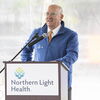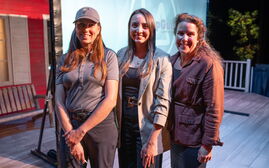
Processing Your Payment
Please do not leave this page until complete. This can take a few moments.
Lewiston restaurants are trying to make a comeback after October shootings
 Photo / Jim Neuger
Paul Landry, chef and owner of Fish Bones Grill, said business has been slow to recover.
Photo / Jim Neuger
Paul Landry, chef and owner of Fish Bones Grill, said business has been slow to recover.
More than seven months after the mass shootings there, restaurants in Lewiston are still struggling to regain their customer base and make the dining scene as comfortable as possible for their patrons.
Melinda Small, co-owner of Legends Sports Bar & Grill, which has struggled since the incident, has seen more customers start to come back, including a young man who was wounded in the Oct. 25, 2023, violence.
“One night we had a group come in and ask for one of our tables out back, near our double glass doors that lead outside. I told him, ‘Of course, and he said his group was celebrating,’” says Small.
“It was so good to hear those words. I went over and asked what they were celebrating and they pointed to a tall young man and told me that this was his first time out since the shooting and he was one of the victims.
"So, I went by his side and said, ‘I promise you that you will be safe and I am so proud of your courage.’ I said, ‘I will sit with you, talk to you and do whatever I need to do to make sure that you have a successful night.’”
That young man, whom she did not name, comes in weekly.
The night and day after
The night of the shootings, a gunman killed 18 people and injured 13 between two spots, Just-in-Time Recreation, at 24 Mollison Way, and Schemengees Bar & Grille, at 551 Lincoln St.
Even for the restaurants that were not directly involved, life changed dramatically that night.
At Fish Bones Grill, in Bates Mill No. 6, owner Paul Landry recalls police surging in and informing customers of what was going on elsewhere in the city. Police evacuated the building and escorted patrons to their cars.
“When it happened, we were immediately told to shut down and lock down,” Landry says. “We left everything how it was, minus shutting down the equipment in the kitchen.”
Things were even more pressing at Legends Sports Bar & Grill, at 4 Mollison Way, two doors from Just-in-Time. Small said people were banging on the doors and windows begging to be let in.

“We had to decide whether or not to let people in,” she recalls. “It is a big decision to make because you don’t know who you are opening the door to. But you could also sense the danger was real and the panic was real.
"We let a few women come in that were pounding on the door and after that, we were told to stay away and to not let anyone else in.”
Small said that it all happened so quickly since her restaurant is just doors down from the bowling alley. In minutes, the police were at the scene and the restaurant and started taking groups of people out to their cars.
In the days after the shootings, some restaurants closed and those that stayed open, with owners hoping at least some people would come in.
But for many restaurants that wasn’t the case.
“The following day, when we went to the restaurant, the road was barricaded. Anytime we needed to get into our restaurant, we needed security clearance,” says Small. “We had no idea when we were going to be allowed back into the restaurant or even reopen due to the road being blocked.”
Legends remained closed for four to five days after the incident, Small says.
“I voiced my concerns to the FBI about the tragedy, obviously. But how do I keep my business afloat and get my employees back in,” says Small. “The FBI worked with us to move the barricade and encouraged news reporters and other law enforcement to come in and have lunch with us.
“But that was only temporary, and then everything was gone. The reporters were gone, the barricade was gone, and there was just silence.”
The morning after the shootings, restaurant owner Paul Landry walked into his Fish Bones restaurant downtown, turned on the lights and saw a sea of tables left just as they were when the police evacuated the restaurant: tables with half-eaten meals, tabs left open, drinks left unfinished, a messy kitchen.

But, like other restaurants and bars in Lewiston, the night has had a prolonged effect.
Months after the incident, the city has remained quiet.
Restaurant goers have been wary of returning to public spots. Holiday gatherings and parties, typically a mainstay for restaurants, did not materialize this past winter.
Shanna Cox, the director of the Lewiston-Auburn Metropolitan Chamber of Commerce, said sales and revenue was down 60% during the holiday season. Most people started to see an uptick in February and March.
“Many restaurants are doing much better now,” says Cox. “The businesses have faced the reality of dealing with their employees who faced a traumatic event and sometimes have anxiety coming back to work.”
What restaurants are doing to regain customers
At Legends, Small has been working to regain customers. The restaurant offers daily deals, including discounts on different menu items, longer happy hour specials and beer tastings.
“I saw enough of a decrease that I evaluated a couple of things in my restaurant,” says Small. “One is that we launched theme nights, so every night of the week, we have a different discount for the consumer. Some of those discounts are related to carry-out or dine-in. I obviously want the dine-in customer, but we really just want the customer. I recently launched [the discounts] in hopes that it will motivate some individuals to come back in.”
Landry said that Fish Bones didn’t want to do anything special to get customers back in. But being open was the message he wanted to send.
“We just open our doors every day waiting for people to pop in,” says Landry. “I think a lot of it is opening your doors and making people feel as welcome and comfortable as we can. There are a lot of people that are concerned.”

Peter Flanders, a partner at the restaurant Bon Vivant, which had only been open two months when the incident occurred, says that it is hard to tell how much the business lost during that time since he doesn’t have the past number to compare it to.
The numbers have been slightly under what he predicted, but he has seen an increase in the past couple of months.
Maine Community Foundation helped raise $6.6 million for a Lewiston recovery fund, which was distributed to victims, families and the community.
“We have openly communicated with customers and decided to continue marketing the way we always have,” says Flanders. “We did receive a grant from Poland Springs, which really stepped up during this time …
"It was appreciated and went to good use. It allowed us to make sure we could keep staff and solidify that time period. It helped us pay for staff for a couple of months so we didn’t have to reduce staff and cut shifts.”
At the heart of the recovery process, the people involved have also been crucial, says Cox of the Chamber.
“Bartenders, in particular, tend to be free therapists for a lot of our community who were either present or connected with somebody who was present so there are a lot of day-to-day interactions that pull up what happened in our community,” she says.
“There are a lot of people in the hospitality industry bearing that burden and I continue to be impressed by our restaurants and those who help run them. At the end of the day, they were the people who were quick to feed our first responders, survivors, and volunteers who were helping both of those groups.”














0 Comments